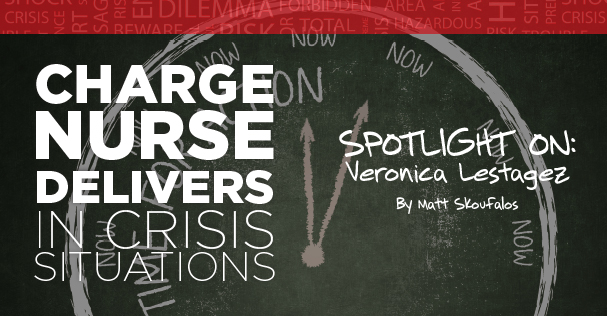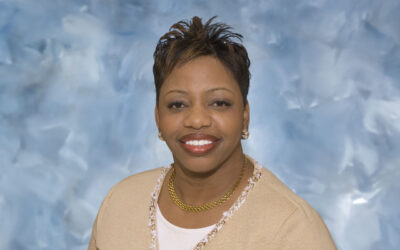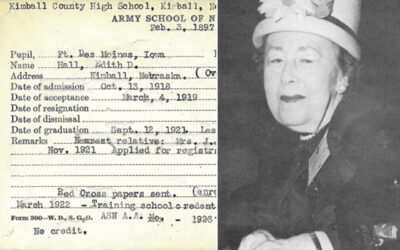Charge Nurse Delivers in Crisis Situations
by Matt Skoufalos
“The OR functions on crisis management…anything that comes through the door, we’ve got to be prepared. It’s constant decision-making. You have to be able to make very quick decisions and turn around and have to do something else.”
— Veronica Lestagez
The first six months to a year in the operating room were brutal, said Veronica Lestagez, Charge Nurse at Atlanta Medical Center.
The mother of four, grandmother to eight, and foster mother to many others began her nursing career with a focus on being a professional caregiver, but found it most informed by her commitment to helping people in crisis.
It was a career choice that ascended along a steep learning curve.

Lestagez had just come to the unit after an assignment as the head nurse of oncology at the same health system. There was no formal training program for the position, she said, and Lestagez said she “hated it” at first.
“I felt woefully inadequate because the OR has a skill set that you don’t acquire on the floor,” she said. “It’s a totally different beast. I remember thinking I had made a huge mistake, but I stuck it out.”
The OR functions on crisis management, Lestagez said; surgeons “want everything yesterday, the staff feeds into that, and we’re not very kind with people who are a little bit slower, trying to learn.”
That singular experience is “totally different” from working in the intensive care unit, working a floor in the hospital, or any other nursing experience, Lestagez said, especially at a level one trauma center.
“Anything that comes through the door, we’ve got to be prepared,” she said. “It’s constant decision-making. You have to be able to make very quick decisions and turn around and have to do something else. You’ve got to somehow find the staffing if you don’t. It can be extremely stressful.”
When Lestagez wasn’t managing patients, she was walking a high wire among the surgical team by catering to the preferences of each, working to match the right patient to the right team of doctors at the right time. But after 33 years at the facility, she said she’s learned a great deal about how to get along in such a fast-paced environment.
“I think we all tend to be crisis-oriented,” Lestagez said. “We have some quiet moments, some quiet cases, but I enjoy working in a level one trauma center because anything can come through the door. There is a satisfaction in taking something and putting it all together. It’s a joint effort, a bunch of people working together for the good of the patient. At the end of the day, you feel burnt out, but darn it, you made a difference.”

For professionals who work exclusively in the OR, there is an emotional disconnection that surfaces, Lestagez said. After receiving a patient in immediate, life-threatening danger, they work to mend the trauma, but seldom know what happens to them after that job is done. There’s no interaction with families or patients after the repairs are made; no understanding of the next chapter of their stories, and sometimes, that’s difficult to bear.
“That is the missing piece in the OR,” Lestagez said. “I think it makes it easier because you can focus directly on patient care; a patient is usually asleep.”
“There is no closure, and like everything else in life, it fades into a memory,” she said.
Some of those memories linger longer than others. Lestagez recalls how, a few years ago, a 16-year-old patient was brought into her surgical suite, the victim of a tragic car accident on her birthday.
“She was in a car with a few of her friends,” Lestagez said. “They were drinking. Her three friends died, and she came up to the OR with everything broken, both arms, both legs.”
“I often think about her, about a bad decision made in innocence that really affected her life,” she said. “As a mother, as a nurse, as an aunt, as a grandmother, I think. I hold them in memory, I say a prayer, I know their journey is going to be affected so much by the trauma they’ve been involved in.”
The job inflicts a great deal of emotional strain on those who work it, and for Lestagez, who describes herself not as religious, but very spiritual, she is calmed by family, friends, and a near-daily hike up Stone Mountain in Atlanta.
She also travels for variety, and has from a young age. Lestagez grew up on an 800-acre farm in the Jamaican countryside, and attended school in a private convent. But when she was 12, she left the island for northern Ontario; other relatives are now similarly scattered throughout North America and the United Kingdom, she said.
After high school, Lestagez said, she got into nursing because she “didn’t really know what she wanted to do” with her life. Her French-Canadian father wanted his daughter to become a physician, but she wasn’t interested in taking that track.
“I met an industrial nurse who encouraged me to go into nursing; I had a sister who was doing nursing in England,” Lestagez said. “Nursing was the only thing I could think of that really spoke to my soul.”
 So Lestagez earned her nursing certificate in Canada, and, in 1979, accepted a contract to go to work at Southern Baptist Hospital in New Orleans. Two years later, she arrived at Atlanta Medical Center, where she’s worked for the last 33 years.
So Lestagez earned her nursing certificate in Canada, and, in 1979, accepted a contract to go to work at Southern Baptist Hospital in New Orleans. Two years later, she arrived at Atlanta Medical Center, where she’s worked for the last 33 years.
“I have learned to be a better person in the OR,” Lestagez said. “I’ve been in the OR so long now that things that I used to really stress over, I can take in stride. I know that in the end, things will work out, doors will open, the job will get done as long as you’re behind it heart and soul.”
“You generally will go home feeling good about yourself,” she said. “It’s people, relationships, being in a place where you want to be, remembering your humanity.”









